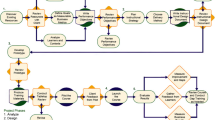Abstract
An evaluation of an Open University course being used in a conventional university revealed a number of complex and interrelated issues relating to student learning. This paper considers some problems in researching this area and focusses on four main themes: the relationship of the student's choice of learning strategy with the requirements of the learning task (in this case a textually based independent study course); the ability of the student to adapt his learning strategy to fit the requirements of the course; the restrictions the task imposes on the possible learning strategies that can be employed; the student's view of learning and knowledge. The paper explores the interplay of these factors, with particular reference to the Open University course being studied.
Similar content being viewed by others
References
Brew, A. (1977). “Perceptual, Cognitive and Learning Styles: Relationships and Inferences”. (Unpublished manuscript). Milton Keynes: The Open University.
Brew, A. (1978). “Developing a methodology for an evaluation”,Assessment in Higher Education, 3 (3): 168–185.
Brew, A., McCormick, R. and Zorkoczy, P. (1978).The Use of an Open University Course in a British University. Report to the Social Science Research Council. (July).
Dahlgren, L. O. (1975).Qualitative Differences in Learning as a Function of Content Oriented Guidance. Göteborg, Acta Universitatis Gothoburgensis.
Dahlgren, L. O. and Marton, F. (1978). “Students' conceptions of subject matter: an aspect of learning and teaching in higher education”.Studies in Higher Education, 3 (1): 25–35.
Entwistle, N. (1977). “Strategies of learning and studying: recent research findings”,British Journal of Educational Studies, 25, (3) (October). pp. 225–238.
Entwistle, N. J. and Entwistle, D. (1970). “The relationships between personality, study methods and academic performance,”British Journal of Educational Psychology, 40: 132–141.
Floyd, A. (1976).Cognitive Styles. (The Open University Course E201,Personality and Learning, Block 5.) Milton Keynes: The Open University Press.
Hartnett, R. T., Clark, M. J., Feldmesser, R. A., Gieber, M. L., and Soss, N. M. (1974).The British Open University in the United States. Princetown, New Jersey: Educational Testing Service.
Laurillard, D. (1979). “The processes of student learning”,Higher Education, 8 (4) 395–409.
MacDonald, B. (1976). “Evaluation and the Control of Education,” in G. Towney, ed.,Curriculum Evaluation Today: Trends and Implications. Macmillan.
Marton, F. (1974). “Some effects of content neutral instructions on non-verbatim learning in a natural setting,”Scandinavian Journal of Educational Research, 18: 199–208.
Marton, F. (1975). “On non-verbatim learning. I: Level of processing and level of outcome,”Scandinavian Journal of Psychology, 17: 41–48.
Marton, F. and Dahlgren, L. O. (1976). “On non-verbatim learning. III: The outcome space of some basic concepts in economics,”Scandinavian Journal of Psychology, 17: 49–55.
Marton, F. and Säljö, R. (1976). “On qualitative differences in learning I — Outcome and process,”British Journal of Educational Psychology, 46.1: 4–11.
Maslow, A. H. (1956). “Defense and growth,”Merrill-Palmer Quarterly, 3 (October): 36–41.
Parlett, M. and Hamilton, D. (1972).Evaluation as Illumination: A New Approach to the Study of Innovatory Programs. Edinburgh: Centre for Research in the Educational Sciences, University of Edinburgh, Occasional Paper (October).
Pask, G. (1976). “Styles and strategies of learning,”British Journal of Educational Psychology, 46 (2): 128–148.
Pask, G. and Scott, B. C. E. (1971). “Learning and teaching strategies in a transformation skill”,British Journal of Mathematical Statistical Psychology, 24: 205–229.
Perry, W. (1970).Forms of Intellectual and Ethical Development in the College Years: A Scheme. New York: Holt, Rinehart & Winston.
Säljö, R. (1979). “Learning about learning,”Higher Education, 8 (4): 443–451.
Schachtel, E. G. (1963).Metamorphosis: On the Development of Affect Perception, Attention and Memory. London: Routledge.
The Open University (1975).The Digital Computer (TM221). Milton Keynes: The Open University Press.
Thomas, L. and Augstein, S. (1972). “An experimental approach to the study of reading as a learning skill,”Research in Education, 8: 28–46.
Witkin, H. A., et al. (1977). “Field dependent and field independent cognitive styles and their educational implications,”Review of Educational Research, 47 (1): 1–64.
Author information
Authors and Affiliations
Rights and permissions
About this article
Cite this article
Brew, A., McCormick, B. Student learning and an independent study course. High Educ 8, 429–441 (1979). https://doi.org/10.1007/BF01680531
Issue Date:
DOI: https://doi.org/10.1007/BF01680531




